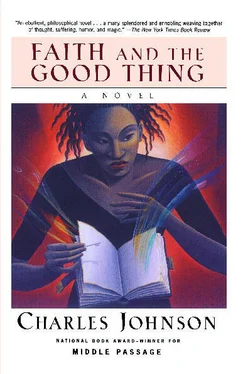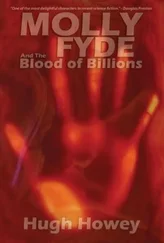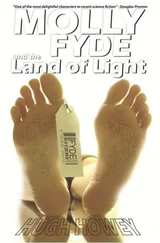Charles Johnson - Faith and the Good Thing
Здесь есть возможность читать онлайн «Charles Johnson - Faith and the Good Thing» весь текст электронной книги совершенно бесплатно (целиком полную версию без сокращений). В некоторых случаях можно слушать аудио, скачать через торрент в формате fb2 и присутствует краткое содержание. Год выпуска: 2001, ISBN: 2001, Издательство: Simon And Schuster, Жанр: Современная проза, на английском языке. Описание произведения, (предисловие) а так же отзывы посетителей доступны на портале библиотеки ЛибКат.
- Название:Faith and the Good Thing
- Автор:
- Издательство:Simon And Schuster
- Жанр:
- Год:2001
- ISBN:9780743215343
- Рейтинг книги:5 / 5. Голосов: 1
-
Избранное:Добавить в избранное
- Отзывы:
-
Ваша оценка:
- 100
- 1
- 2
- 3
- 4
- 5
Faith and the Good Thing: краткое содержание, описание и аннотация
Предлагаем к чтению аннотацию, описание, краткое содержание или предисловие (зависит от того, что написал сам автор книги «Faith and the Good Thing»). Если вы не нашли необходимую информацию о книге — напишите в комментариях, мы постараемся отыскать её.
Faith and the Good Thing — читать онлайн бесплатно полную книгу (весь текст) целиком
Ниже представлен текст книги, разбитый по страницам. Система сохранения места последней прочитанной страницы, позволяет с удобством читать онлайн бесплатно книгу «Faith and the Good Thing», без необходимости каждый раз заново искать на чём Вы остановились. Поставьте закладку, и сможете в любой момент перейти на страницу, на которой закончили чтение.
Интервал:
Закладка:
Lying there on the bed she could hear no sound but the rush of Tippis’s birdlike breathing. Her eyes could not adjust to the darkness of the stuffy room — it was like fog, or the oval heart of a hippogriff, laced through and through with an inky material that absorbed any light from under the door. A feeling of vertigo crawled from her stomach to her throat. Fingers caught at her wrists.
To the darkness Faith said, “Arnold—?”
He gave no sign. But upon her fell his entire weight, driving her back along the bedspread on which she felt the raised pattern of flowers. She guessed — peonies. And gasped. A long, agonized breath smelling of tobacco and sour cream blew against her face, slipping down her throat as she struggled to take in air. She wanted to scream.
Tippis did things to her there in the lightless room at the end of the hall that should, if possible, be exorcised from memory. She lay perfectly rigid, tight-lipped like a corpse with rusty pennies on its eyes — praying. No one, apparently, heard. For Tippis continued, his lips humming, and in his mouth was a gurgling sound. Faith twisted her head and vomited over the side of the bed, no longer praying now, but thinking, “To me. not to me is this happening.” Not to that well-protected portion of herself that came spinning forth whenever she said, “I. me. myself,” not to her, but to some part other than herself, some weak and vulnerable part that could so easily be made an object, that was incapable of escaping circumstance and chance. To herself she whispered, “This is bad, Faith. Bad. Faith.” The darkness helped. She couldn’t see him, or what he was doing, and it was easy to dam her ears to his breathing by shouting deep within her mind again and again:
“I am Faith Cross.
“I am Faith.
“I am .
“I.?”
Outside, through the thin walls, she heard from afar the racing of an automobile engine, rubber squeal against pavement and the sound fade away, then — in her ears, louder now — Tippis’s short breaths hungrily sucked in through his nostrils, and a whistle hiss through his teeth. He showered her with sweat and raked at her with his nails. She was his. There was pain and the salty smell of blood, but, oddly enough, no longer was there terror. For this was not happening to her, only to another, to a shadow of herself. To a thing apart, out there, like the odd-shaped bottles and brooms in Lavidia’s kitchen, like the people in the bar.
After what seemed like hours Tippis was done. He clicked on the ceiling light, and Faith saw the wretchedness of her room: a water-ringed door, big yellow flowers on gray wallpaper, cracked sink sticking from the garishly papered wall like a goiter; a broken writing table beside the sagging bed, sticky, damp corners behind an enormous radiator, and bare, warped floors. And on the spring-mattress bed — enough blood to account for a knifing, and whiter stains where Tippis, somehow thinking of her at the last instant, had withdrawn. After dressing he placed a twenty-dollar bill on the bed. His face was pained, it lacked all pleasure. He looked like one possessed, though momentarily freed, but only briefly, only for a heartbeat. At the door, he tried to smile, and broke into song:
“Here’s to fucking that makes a man a fool;
Opens up his pores, wears away his tool—
He gets on a woman but hasn’t long to stay,
His head’s fulla nonsense, his ass’s fulla play;
He gets on like a lion, and slips off like a lamb,
Tries to look passionate, but he isn’t worth a damn.”
Tippis left.
On the bed, breathing in the heavy blood-and-semen smell filling the room, Faith lay spread-eagled, her eyelids closing and her limbs as motionless as those of a wind-up doll now run down and lying like dirt, or defecation, or yesterday’s newspaper, wet and blurred, in the middle of the road. Through the wall behind her she heard radio music playing in the next room, but this she grew unaware of, for her mind — clear and as smooth as a sea stone beaten by waves and elements for a millennium — registered no sensation, held, in its broken glass frame, no reflections. It was, momentarily, dead. No thoughts came to her, not for a while; then, gradually, her breathing grew as rhythmic as the music next door, rising, falling. Falling. She thought, but did not stir. She started to inch slowly, her eyes shut tight and fists clenched, along the interior of her memories — some immediate, some older, some perhaps written into her blood, or cells, or synapses before she was born — timidly feeling the impressions etched there, like ancient friezes or the faded images of brown bison in moist mountain caves. From cavern to cavern she moved, like a child lost in the anfractuous corridors of an art museum with high walls, until she saw, for reasons obscure to her, the first time her father had taken her into town, on a Saturday morning, and for the purpose of buying meal. The summer sun had baked the road to hot, dry dust, had heated the inside of his old Edsel so its torn cushions burned her skin at the touch; the air itself was thick with steam, hot in her lungs, and raised water from the pores on her chest and arms. Todd stopped at a one-pump filling station two miles outside of town, put in a dollar’s worth of ethyl, and Faith — quite young then and naïve to the ways of the world — had asked to use the washroom. She was refused. The man responsible was really a boy, an ugly one at that, with ash-white hair tumbling into his eyes. He had bony arms knotty at his elbows, and his smooth belly pushed through an opening in his plaid shirt, overrode his cowboy belt. He was snaggle-toothed, and bent forward slightly when he took Todd’s dollar, careful not to let Todd’s darker hand touch his own. Todd raged — no. No. It had not happened that way. Not at all. Clearly now she saw her father grinning sheepishly, lowering his eyes to the boy’s muddy boots, and asking in a slow, clumsy voice where — if it was permissible and would not upset the delicate, divinely established order of things, of spiders and sinners and martyred saints whose hierarchy led to a too, too remote Deity — Faith could relieve herself. “In the bushes,” the boy said, “behind the station.” And Todd, taking her by her hand, and trembling across his six feet — though now he looked less than five — led her past the open door of the clean women’s room and set her down in the bushes. He said nothing the remainder of the hot ride into town, nothing as he shopped, and nothing on the way back home. Nothing. And this, she knew, was how he reacted always: never defiant, never confident save when he was alone, or walking behind his farmhouse, or seated late at night like a peaceful wizard before his own fireplace; never indignant or righteous until that spring day three hitchhikers from the next county stopped him on the road, first asking directions, then asking if — through accident or design — he had ever had a white woman, and finally demanding that he remove his trousers to satisfy their curiosity. It was all so clear: the way he stepped quickly aside, or into the street, regardless of mud or traffic, when men smaller than he, perhaps in soul as well as body, came abreast; the begrudging yet servile and obsequious way he used the rear entrances of stores in town, bought clothes without first trying them on, without letting them touch his flesh as the management demanded — the look of futility in his eyes at the end of each summer when he released, without a word of objection, half the produce from their sharecropper’s yield. And especially the way he acted when men, roaring by in cars on weekends, would hoot and jeer at Lavidia while she worked in the fields: Todd turned his head. So Lavidia hated him, perhaps because she knew that pitiable side of Todd that lay within the confines of history, or perhaps because she knew his subservience was necessary to put food on their table, that he ceased to be human simply. to be, to taste, to hear and smell and see the infinity of worldly sensations, even though he enjoyed them through the odd, invisible bars of his imprisonment. So it came to this: his world of pots and pans with proper names was not created by an act of freedom, but by necessity — an escape it was. A valve. On the day of his death alone had he been forced too far; they ignored his forced, jocular, and polite replies to their pointed questions concerning his promiscuity. He had laughed even when they demanded of him what he could not do; and then he turned on them, screaming as though his mind had snapped when they forced it upon him. And so Todd died. But the situation was worse than she’d imagined. She saw, plummeting deeper, that the past was final, irreversible. Each act added to her ongoing essence, was whipped in like batter, or dissolved like sugar in water — invisible, but there nonetheless. Worse, not only your acts but those of others, those who made you an object, were mixed in as well. And these you could not control. What to do, what to do? Tippis had taken her, and paid for his taking; she was placed, placed, and burned deep into her was the label: whore. It was true. A part of her was no longer her own, not for her now, but for another. Had it not always been so? Deeper, farther down the descent, she saw the extent of her own otherness. How much there was in her makeup that was beyond her control, her freedom and reason and magical thinking could only be guessed at, for she could not have witnessed all history. She could not have seen every human deed done, kneaded, whipped into her essential self, her factualness. But she saw its broad curves, its crucial contours. She saw them coming, leaving the great amphitheater of hills at Havana Harbor in a three-hundred-ton slave ship called The Trinity, a sleek ship with an arrowy hull cutting through the storms of the Atlantic, coming with bearded freebooters and buccaneers, coming with cotton bales hollowed at their center, watered-down kegs of Irish whisky and kegs of gunpowder stacked in rows in the hold. Coming for trade along the Gold Coast. Armed with firelocks and cutlasses, they lower their skiff against the water and move to the slave factory at Bangaland, miles from the interior where, the month before, Mandingoes and Fussah were herded in leg irons, whipped, brought to heel — all of them, the debtors, the thieves, the dark prisoners of war and religious heretics. They pick, these restless seamen, no women over twenty-five, or sickly youths, or the ones with tribal incisions and spiraling tattoos on their faces. But they pick the young princess, the chieftain’s favorite daughter: they pick Faith. She is easily worth two bars, a musket, and a case of gin; the others — the men — they, too, are picked, but only for a lifetime of labor on Alabama plantations and Argentina estancias. Faith they pick as the captain’s concubine: it has always been so. In her eyes is defeat and — yes, even submission (though the legend-makers will lie of this to save face), for she has seen the gutting of her village with flame and sword, seen the smashing of her centuries-old temples and, thus, the death of her gods. She struggles with her leg iron and is brought by the action of the boatswain’s whip to her knees. Her head is shaved, her ornaments, anklets, and skin kilts decorated with bright brass beads are stripped away, her body is bathed in oil, and her buttocks branded with a bent wire dipped in fire. Around her, in the difficult Soosoo dialect, her own tribesmen shout for mercy. But their gods are dead. They are separated, husband from wife, father from son, and tossed into the belly of The Trinity with tribesmen of a different tongue. Faith crosses the Atlantic in darkness, sitting chained on another’s lap, or lying, not on her left side where the pressure will be against her heart, but on her right for the entire voyage, surrounded by the sick, the dying: dropsy, pleurisy, flux, malaria, and scurvy — the worst cases are jettisoned overboard, but not at a loss, for in Liverpool, Boston, and Madrid, The Trinity’ s shareholders expect only sixty slaves, the ship’s capacity. On this voyage, as on all others, The Trinity holds one hundred. Naked, weakened, and frightened, she arrives, is taken to the auction block after a bath and hasty meal, and sold. Twenty dollars. But that is not the beginning, not at all. Beneath her thoughts are more impressions, older ones of an ancient, colithic world — a continent in the lush, tropical zone now sunken into the Indian Ocean, but upon which a highly developed race of bearded anthropoid apes traveled in bands through the trees. Some drop to the ground. It is she among them, a woman-thing with pointed ears and razor-sharp teeth; yet she is as strong as all the others, perhaps stronger, because within her loins is the mystery of being. And there, on the not yet firm soil rolling with monstrous vegetation, covered with white volcanic ash and crawling with fierce, many-fanged accidents of nature, she — an accident, too — discovered that her forearms, once used for clasping limbs and scaling trees, were free when she took to the ground. They were free to snatch fruit and stones, spears and clubs. And in that habit of clasping, the hands themselves changed; the bones grew differently over the ages, altered to perform more delicate operations such as seizing red, raw meat from fires sprung by lightning, such as planting seeds and planning harvests from observation of the moon and stars and seasons, while the brain itself and larynx and her body as a whole rushed to pace the development of the hand — to create man, society, and history; to build swift clippers and slave ships and manacles to make men, and especially women, the objects of desire; to weave the thick rope that stretched the strong neck of Todd Cross that hot spring day.
Читать дальшеИнтервал:
Закладка:
Похожие книги на «Faith and the Good Thing»
Представляем Вашему вниманию похожие книги на «Faith and the Good Thing» списком для выбора. Мы отобрали схожую по названию и смыслу литературу в надежде предоставить читателям больше вариантов отыскать новые, интересные, ещё непрочитанные произведения.
Обсуждение, отзывы о книге «Faith and the Good Thing» и просто собственные мнения читателей. Оставьте ваши комментарии, напишите, что Вы думаете о произведении, его смысле или главных героях. Укажите что конкретно понравилось, а что нет, и почему Вы так считаете.












